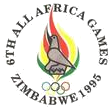 Official logo of the Games | |
| Host city | Harare, Zimbabwe |
|---|---|
| Nations | 46 |
| Events | 17 sports |
| Opening | 13 September |
| Closing | 23 September |
| Opened by | Robert Mugabe |
| Main venue | National Sports Stadium |
The 6th All-Africa Games, also known as Harare 1995, were played from 13 to 23 September 1995 in Harare, Zimbabwe. 46 countries participated in eighteen sports.
Contents
South Africa, having previously been banned from competition by the other African nations, was invited to the games for the first time after the fall of the Apartheid regime. [1]
With a record 6,000 athletes participating in the games, the event were in danger of growing unmanageable. The then president of the International Olympic Committee, the Spaniard Juan Antonio Samaranch expressed concern over the dizzying growth of the event in just 4 years, asking the organizers of the next editions to avoid applying the same scale of the Summer Olympics.
Petty controversy again entered the games. An Egyptian woman handball player was accused of being a man [2] and the Egyptian team protested that the lace sleeves worn by the South African gymnasts were too "sexy".
Mozambique's World Champion 800 meter runner Maria de Lurdes Mutola won her specialty in Harare.
Of the 17 sports on the program, 8 were open to participation by women: athletics, basketball, gymnastics, handball, swimming, table tennis, tennis and volleyball. Women's diving and netball were to be included but were reduced to demonstration sports due to a lack of entries.
At the closing ceremonies the torch was passed to Johannesburg, South Africa to begin preparations for the VIIth All-Africa Games in 1999.